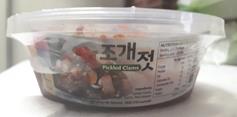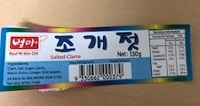Salted clams from China and Korea appear to be the common factor in a spate of hepatitis A cases in various countries.
 According to the Korea Biomedical Review, the Korea Centers for Disease Control and Prevention (KCDC) said that it has confirmed that contaminated fermented shellfish was the main culprit behind the hepatitis A outbreak this summer.
According to the Korea Biomedical Review, the Korea Centers for Disease Control and Prevention (KCDC) said that it has confirmed that contaminated fermented shellfish was the main culprit behind the hepatitis A outbreak this summer.
The KCDC came to the conclusions after conducting an in-depth epidemiological investigation.
The agency randomly sampled 270 of the 2,178 hepatitis A patients, diagnosed between July 28 and August 24, and surveyed whether they consumed fermented shellfish this summer. It found that 42 percent of the patients had eaten fermented shellfish during the incubation period.
KCDC also found that 80.7 percent of the 26 patients diagnosed with hepatitis A in August also ate fermented shellfish, while discovering Hepatitis A virus genes in 11 batches out of the 18 batches collected after the outbreak.
Notably, five of these genes found in the research showed close relations with the virus detected in hepatitis A patients.
 As of now, the disease control agency has confirmed 10 products that have tested positive to the hepatitis A virus. Nine of them were imported from China, and one was made in Korea.
As of now, the disease control agency has confirmed 10 products that have tested positive to the hepatitis A virus. Nine of them were imported from China, and one was made in Korea.
“Out of the total 10 products, weighing 37,094kg, 31,764kg has already been sold to the markets, while the remaining 5,330 kg were recovered and disposed of,” the agency said.
Yesterday, the Australian NSW Food Authority advised that Byul Mi Kim Chi is conducting a recall of Salted clams, due to a possible microbial (Hepatitis A virus) contamination. Further, Koryo Food Co. is conducting a recall of Pickled clams, due to a possible microbial (Hepatitis A virus) contamination.
NSW Food Authority CEO, Lisa Szabo said testing was underway on a number of products but full results may take a number of weeks.
“Although a contamination has not yet been confirmed, we have advised the companies of a potential link to 8 cases of hepatitis A in NSW, and they have both undertaken a recall of the product,” Dr Szabo said.
